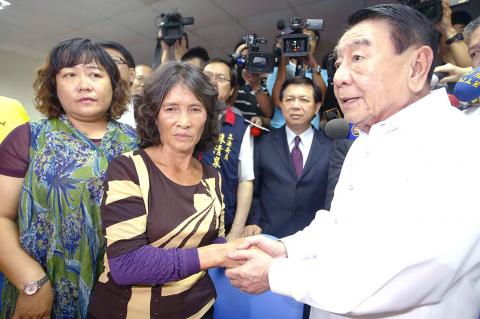|
Government lifts
Philippines sanctions
SORRY: Amadeo Perez said he had been authorized
by the Philippine president to ‘personally convey the president’s and the
Filipino people’s deep regret and apology’
By Shih Hsiu-chuan / Staff reporter

Manila Economic and Cultural
Office Chairman Amadeo Perez, right, meets with the family of Hung Shih-cheng in
Pingtung County yesterday to apologize for Hung’s death.
Photo: CNA
The government has lifted the 11 sanctions
leveled against the Philippines following a deadly dispute involving the death
of a Taiwanese fisherman, Minister of Foreign Affairs David Lin (林永樂) announced
at a press conference in Taipei yesterday.
Three months after the death of Hung Shih-cheng (洪石成) at the hands of Philippine
Coast Guard personnel, his family yesterday had their demands met when Manila’s
emissary apologized at a press conference in Pingtung County’s Siaoliouciou
(小琉球).
Manila Economic and Cultural Office Chairman Amadeo Perez read a statement to
the family that he had been authorized by Philippine President Benigno Aquino
III to “personally convey the president’s and the Filipino people’s deep regret
and apology” to the family for the “unfortunate loss of life of their loved
one.”
Perez said he also came to inform the family that the Philippine Department of
Justice “is committed to prosecuting” the eight coast guard personnel who stand
accused of the killing “at the soonest possible time” based on the results of an
investigation released on Wednesday.
The Philippines has drawn “valuable lessons” from the tragedy and has borne in
mind the desire Taipei has expressed to Manila that use of force should be
avoided in the enforcement of fisheries laws to prevent similar incidents in the
future, Perez said.
After reading the statement, followed by sentence-for-sentence translation from
English into Hoklo (also known as Taiwanese), Perez presented a “letter of
condolence” to the Hung family.
He did not take any questions from reporters.
After Perez left, Hung Tzu-chien (洪慈綪), the 65-year-old captain’s eldest
daughter, told the press that her family had accepted the apology, which was
“belated justice” for them, although they were “not 100 percent satisfied” with
the outcome.
Hung Shih-cheng died in a fatal shooting on May 9 when a Philippine government
vessel operated by Philippine Coast Guard personnel attacked his fishing boat,
the Kuang Ta Hsing No. 28, in waters where the exclusive economic zones of the
two nations overlap.
“What we have hoped for since my father died was an open and formal apology from
the Philippine government,” Hung Tzu-chien said.
When asked to elaborate on dissatisfaction, Hung Tzu-chien said she felt it was
a pity that reporters were denied a chance to raise issues regarding the
long-term harassment that Taiwanese fishing boats have suffered at the hands of
the Philippine Coast Guard over the decades.
“We hope that my father is the last person to die under these circumstance and
that the government begins to negotiate fishing rights with the Philippines.
Only when the negotiations generate a favorable outcome will my father be able
to rest in peace,” she said.
Perez traveled to Taipei on May 15 to negotiate with the government, but he was
denied a meeting with Lin because the Philippines had failed to meet a deadline
to give satisfactory responses to four demands made by the government. He was
also denied a visit to the victim’s family.
In addition to the formal apology, Taipei had demanded compensation for Hung’s
family; an investigation into the incident to uncover the truth and punish the
perpetrators; and talks on the signing of a fishery agreement to help prevent
similar incidents in the future.
Taiwan imposed the 11 sanctions on May 15, including freezing the hiring of
Philippine workers, until Manila met the four demands.
A compensation deal was reached between the family and lawyers representing the
Philippine government on Wednesday night, with a provision that the figure would
remain confidential.
Perez traveled to Taipei last night to meet with Lin.
After the meeting, Perez stopped to take questions from reporters, saying that
the Philippine government is willing to continue fisheries talks with Taiwan on
the basis of the first round of talks held in Manila in June.
“A second round of talks will be held in Taipei in a month or so,” Perez said.
At the press conference held at the ministry last night, Lin said the government
decided to lift the sanctions because Manila had given positive responses to the
four demands “in a formal letter to the ministry” as well as “in the actions it
has taken.”
The responses presented by Perez to the ministry had been reviewed at a meeting
of the National Security Council at the Presidential Office, and President Ma
Ying-jeou (馬英九) and Premier Jiang Yi-huah (江宜樺) had been consulted on the issue,
Lin said.
Lin also issued an appeal to the Philippines — that its judiciary try the eight
coast guard personnel as soon as possible; that Taiwan and the Philippines
continue fisheries talks and establish mechanisms to ensure the consensus
reached in June that both sides refrain from using violence; and that both sides
take actions to alleviate tensions, specifically in talks over a bilateral
economic cooperation agreement.
Lin’s announcement drew criticism from opposition lawmakers.
Democratic Progressive Party Legislator Pan Men-an (潘孟安) said the lifting of
sanctions prior to any action on the Philippine side — including an apology from
the highest administrative branch in the Philippine government, the lack of
punishment of the perpetrators of the shooting and the completion of the
fisheries negotiations — would be considered a “weak” response by Manila.
People First Party Legislator Chen Yi-chieh (陳怡潔) said the level of the
Philippine envoy was no higher than in May, plus the Philippines’ report into
the shooting did not state that it was an “intent to kill” that resulted in
Hung’s death.
Additional reporting by Chen Yen-ting
|
![]()
![]()
![]()